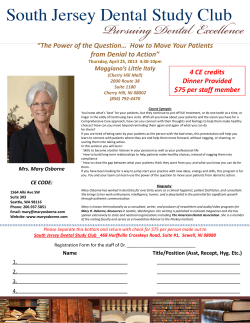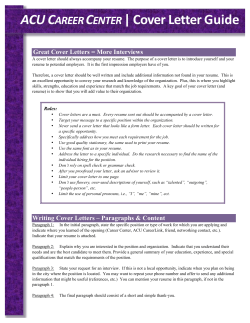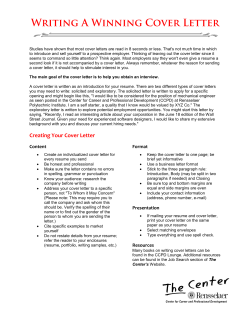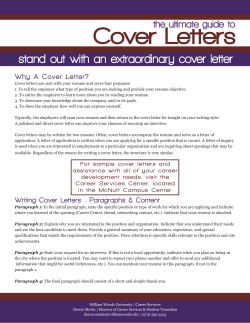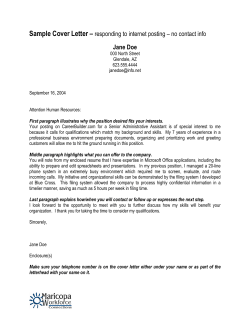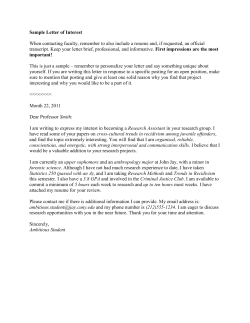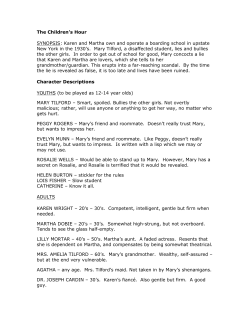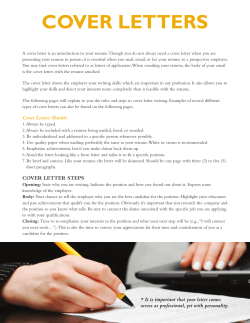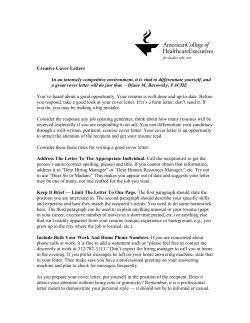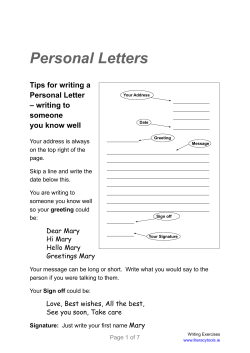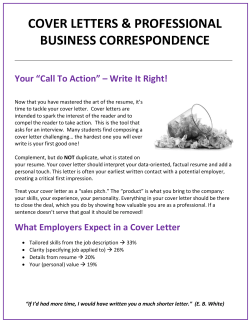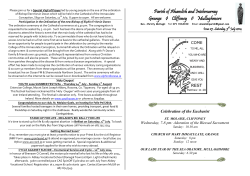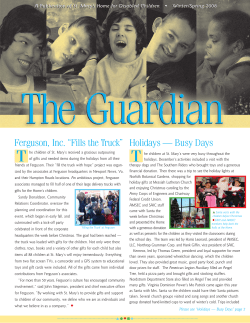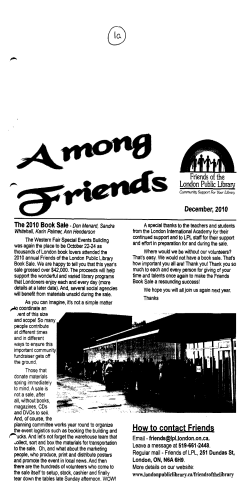
Guide to the Cover Letter
Guide to the Cover Letter Introduction Career Exploration Resumé & Cover Letter Networking Job Applications Interview Almost every formal job application involves the submission of a cover letter along with the resume and standard job search etiquette requires it. Not submitting a cover letter may be perceived as lazy, ill –informed, or not being serious about the position in question. Cover letters are utilized as a first screening, and provide employers with an important first impression of your candidacy and communication skills. Utilizing this guide, you will find: 1. 2. 3. 4. Content: What you should include in a cover letter Formatting: How to structure your letter Sample Cover Letter Best Practices Content While a resume is a summary of your background and qualifications, a cover letter explains why you’re sending the resume. In other words, it serves as a complement, not duplicate, of your resume. It may take a more story-like approach or in-depth explanation of certain important skills or experiences mentioned in your resume. Heading Example Lisa Smith 300 Main Street, Los Angeles, CA 92804 (000) 000-0000 lisasmith@email.com Provide your contact information o Name o Address o Phone Number o Email Address Include the date you are writing the letter. Include the address of the company o If at all possible use the name of the specific person or individual in charge or interviewing or hiring. This can be acquired through searching the company website or online directory or calling to inquire. Sending your application to a specific person increases your chances of your candidacy being taken seriously. December 18, 2012 Mr. Daniel Grey Saint Mary’s Hospital 200 Job Rd. Madison, WI 48105 2 Introduction Example Greet/provide a salutation to the specific person with whom you are corresponding. If upon searching you still cannot locate a name, “Dear Hiring Manger” will suffice. State the position you are applying for and where you heard about it. Name drop if you have a good connection. o However, make certain that your reader has a positive relationship with that person if you are going to include their name. State why you believe you are a good match for the position and the organization, including 2-3 key qualifications that you will address in the rest of the letter (these items should match up with your resume). Body/Argument I was elated to hear about your new position of LEAN Manager from my colleague, Mary Dalton who works in the St Mary‘s Health System Operations Team, and would like to meet with you to discuss this opportunity further. With the advent of the Patient Protection and Affordable Care Act, the position presents an excellent opportunity to work on some of the complex challenges currently facing the healthcare industry, as well as St Mary’s. I believe my 10 years’ experience as a healthcare operations consultant and manager have given me both the depth and breadth of skill and experience needed by St Mary’s to tackle challenges which include among others, rising budgetary constraints and system inefficiencies. Example After speaking with Ms. Dalton, its seems St. Mary’s is facing some unique goals, which include, St Mary’s goal to increase profit through eliminating waste and reducing inefficiencies by reaching a six sigma level of 3.5- an inspiring organizational goal. My LEAN Six Sigma Master Blackbelt certification, as well as 10 years’ experience in teaching and applying LEAN principles in practice, leads me to believe my background and skill closely matches this goal. This can be further illustrated by the 2 year project I lead with the University of Michigan Health system with regard to inventory management of heart apparatus at the Cardiovascular Center. This process improvement project enabled the organization to save $1.6M per year by uncovering a series of complex sub-optimization flaws and re-engineering order entry processes. These skills of data collection, value stream mapping, advanced root cause analysis and change management will help St Mary’s achieve both its short term budget constraints and its long term goal of achieving a 3.5 sigma level. Tailor cover letter for each job application. Focus each paragraph on one qualification that shows you are a good match for the job and organization. Give specific examples to prove where you got these skills and how you have used them before (see Support your Claims) Tell a story or cite examples; do not just list your skills (see Support your Claims) Refer to your resume; do not repeat it. Do not use contractions. Closing Dear Mr. Grey: Example Close with a strong reminder of why you are a good match for the job and the organization. Request an interview in some way. Provide contact information. Express appreciation for consideration Sign your name and print it underneath. Include the term ‘Enclosure’ after your name to indicate the inclusion of your resume 3 I believe my work experience in LEAN will provide the leadership needed in your Operations team to assist St Mary’s in attain its waste reduction and streamlining goals. I look forward to meeting with you to discuss the job position further. I will contact you before January 15th to discuss my application. If you wish to contact me, I may be reached at 000 000 0000, or by e-mail at lisasmith@email.com. Thank you for your time and consideration. Lisa Smith Enclosure Format and Structure We suggest a conventional or traditional business approach to cover letters. While there may be creative positions that call for a different approach, the majority of applications, and standard convention, calls for a strict business format. Impress readers with excellent content as well as elegant, clear formatting. Take note of the following: Single-space your cover letter Leave a space between each paragraph Leave three spaces between your closing (such as "Sincerely" or "Sincerely Yours") and typed name Leave a space between your heading (contact information) and greeting (such as, "Dear Mr. Smith") Either align all paragraphs to the left of the page, or indent the first line of each paragraph to the right Use standard margins for your cover letter, such as one-inch margins on all sides of the document Center your letter in the middle of the page; in other words, make sure that the space at the top and bottom of the page is the same Sign your name between your salutation and typed name Include the word Enclosure after your name to indicate the inclusion of a resume Always match the paper and font style of your resume to your cover letter Sample Cover Letter Lisa Smith 300 Main Street, Los Angeles, CA 92804 (000) 000-0000 lisasmith@email.com December 18, 2012 Mr. Daniel Grey Saint Mary’s Health System 200 Job Rd. Madison, WI 48105 Introduction How you heard about the position and mention someone at organization that you know Your objective: An Interview Brief background on the organization and its goals How your experience matches the position and how you will help the organization achieve its goals Dear Mr. Grey: I was elated to hear about your new position of LEAN Manager from my colleague, Mary Dalton who works in the St Mary‘s Health System Operations Team, and would like to meet with you to discuss this opportunity further. With the advent of the Patient Protection and Affordable Care Act, the position presents an excellent opportunity to work on some of the complex challenges currently facing the healthcare industry, as well as St Mary’s. I believe my 10 years’ experience as a healthcare operations consultant and manager have given me both the depth and breadth of skill and experience needed by St Mary’s to tackle challenges which include among others, rising budgetary constraints and system inefficiencies. 4 Body: Paragraph 1 Expand on organizational goals and mission (through company research or contact with internal advocate) How you can help the organization reach its goals Specific example to support your claim (based on information in resume) How this skill or experience will help the organization After speaking with Ms. Dalton, its seems St. Mary’s is facing some unique goals, which include, St Mary’s goal to increase profit through eliminating waste and reducing inefficiencies by reaching a six sigma level of 3.5- an inspiring organizational goal. My LEAN Six Sigma Master Blackbelt certification, as well as 10 years’ experience in teaching and applying LEAN principles in practice, leads me to believe my background and skill closely matches this goal. This can be further illustrated by the 2 year project I lead with the University of Michigan Health system with regard to inventory management of heart apparatus at the Cardiovascular Center. This process improvement project enabled the organization to save $1.6M per year by uncovering a series of complex suboptimization flaws and re-engineering order entry processes. These skills of data collection, value stream mapping, advanced root cause analysis and change management will help St Mary’s achieve both its short term budget constraints and its long term goal of achieving a 3.5 sigma level. Body: Paragraph 2 You may want to include a second ‘argument’ paragraph which would include further detail about the specific position requirements, your claims as to how you meet these requirements and an example to substantiate the claim, finally, tie this back by ending the paragraph with how this will help the organization. Repeat your objective: An Interview Provide contact information Thank the reader and close the letter in a professional manner Provide name and signature Enclosure (to indicate the inclusion of resume) I believe my work experience in LEAN will provide the leadership needed in your Operations team to assist St Mary’s in attain its waste reduction and streamlining goals. I look forward to meeting with you to discuss the job position further. I will contact you before January 15th to discuss my application. If you wish to contact me, I may be reached at 000 000 0000, or by e-mail at lisasmith@email.com. Thank you for your time and consideration. Sincerely, (3 spaces) Lisa Smith Enclosure 5 Best Practices Be Targeted As with resumes, the more customized and targeted to a specific company and position, the better and more effective your cover letter will be. Ensure you understand and address skills or experiences sought by the hiring manager and address them specifically. By mentioning something about the company (through website research or networking) such as new initiatives or having met someone who works there, you display commitment and seriousness to the company and position at hand. Never copy and paste the same cover letter! It is obvious to the reader. (Please see our Networking Guide for further information as to how to facilitate connections with unknown contacts at potential employers.) For Informal applications Sometimes a connection may offer to pass your resume along to a potential employer- in these cases candidates need not necessarily create a formal cover letter. However, including a brief cover letter thanking your friend/relative/connection for his kindness in passing on your resume provides an opportunity to display your communication skills if your friend forwards on the letter to his contact. Remember to also include a reminder of your goal (job, internship) and career interest. Be reader-centered Position your cover letter on what you can do for the employer rather than what the job will do for you. Certainly the job will provide you with experience, exposure to solving real world problems and valuable contacts, but remember the point of your cover letter is to get the employer interested in you based on their needs, not yours! Length A cover letter should be no longer than one page. Approximately, three to four paragraphs in length with ample top and bottom margins. Although there are exceptions (e.g. an experience needs to be described in more detail), in general, a one-page letter with an introduction, a one or two paragraph body, and a conclusion is usually sufficient. Do not expand to two pages. Support your claims The main weakness in most cover letters is unsupported claims. Job applicants frequently describe their strongest attributes in glowing terms, but fail to give examples or illustrations which lend credibility to their statements. One way to ensure you’ve supported your statements is to use the “claim, data, warrant” method devised by Stephen Toulmin which provides a method for identifying parts of a written argument. The claim is your statement—your conclusion about yourself. Data is what you use to support that statement, and the warrant is the bridge which connects the two or relates them to each other. 6 Example In sentence “I am a very responsible person and would do an excellent job for you in this position,” you have two claims. The first claim is “very responsible person” and the second is “would do an excellent job,” but it does not include any data or warrant. These are easy claims for anyone to make and thus, not very persuasive. Here is an example of how the same idea could be better expressed using data and the warrant: “I am a very responsible person. For example, when I worked for Jones, Inc., I was put in charge of new customer accounts and, after three months, allowed to work independently of any supervision. Nine months later I was commended on my performance appraisal for being ‘diligent, hard-working and responsible.’ Because you’ve indicated responsibility is a key component of this job, I believe I would do an excellent job for you.” KEY TAKE AWAY Supporting your claims with data, and connecting ideas with examples, will enhance your cover letter and make it easier to read and more persuasive. Should I leave it up to the employer to contact me? A week to ten days after sending a cover letter, follow up with a phone call or email to the employer. It is acceptable to mention at the conclusion of your letter that you will follow-up. This is a way to show your sincere interest in the job and illustrate your continued commitment. Potential employers may also read your documents with more interest if they know you will be calling them in the future. However, if you tell the hiring manager you will follow-up, it is important to do so. It will not reflect well on you if you forget to call or email a potential employer when you said you would. If you do not feel comfortable informing the hiring manager when you will contact them, ask your readers to contact you, and thank them for their time. For example: “Please contact me at 000 000 0000, or by e-mail at lisasmith@email.com. I look forward to speaking with you. Thank you for your time and consideration.” References Do not include “References available upon request” in your cover letter, this is assumed by the hiring manager. Rather, to save the hiring manager trouble, you could simply include the standard three references (full names, and contact information including telephone number and email) in your application on a separate sheet. 7 Review Always proofread your cover letter very carefully before sending it. Typo’s and grammatical errors speak poorly to your potential candidacy and research shows that recruiters for businesses notice mistakes in grammar and syntax. It may be helpful to put it aside for a couple of days, if time allows, and then reread it. You may find sentences that could be improved or grammatical errors. It is also always helpful to have a second or third pair of eyes on the document. Ask friends or colleagues to review the letter and revise as you see fit. 8 References Cover Letters: How to Write a Cover Letter http://jobsearch.about.com/od/coverletters/a/aa030401a.htm How to Write a Cover Letter. http://www.forbes.com/sites/susanadams/2011/03/24/how-towrite-a-cover-letter/ Owl Purdue Online Writing Lab: What is A Cover Letter. http://owl.english.purdue.edu/owl/resource/549/01/ University of Michigan Ross School of Business: The OCD Guide to the Cover Letter (MBA) 9
© Copyright 2025
